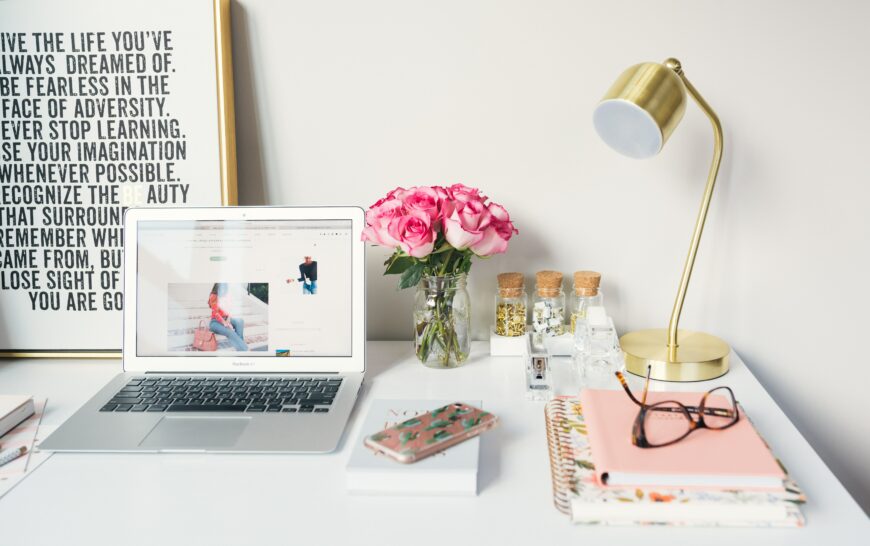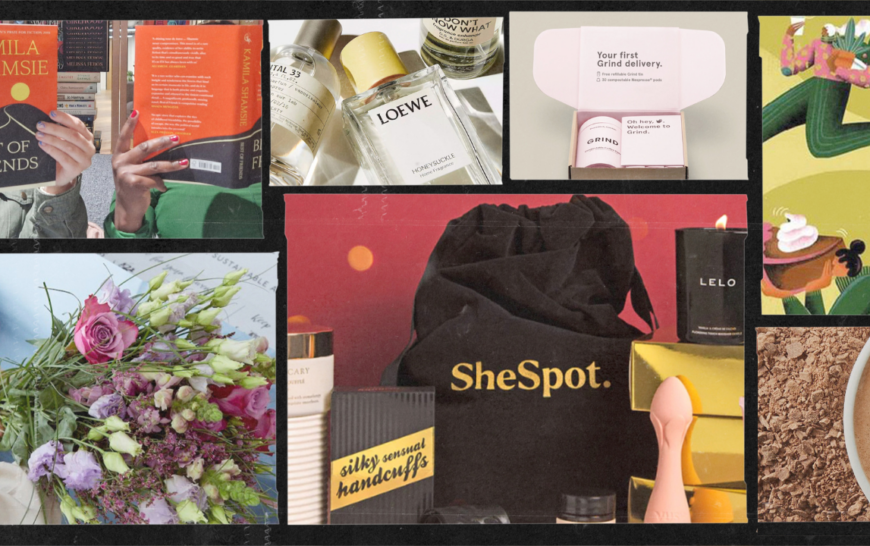
Today might be called ‘Earth Day’ but in truth, every day is Earth Day when there’s a planet to protect. First launched in 1970 as a way to teach environmental awareness, the annual celebration and call to action is now in its 50th year and thought to be the largest secular observance in the world.
We spoke to some of our favourite slow living influencers to get their best advice on how we can lead a more conscious lifestyle. Now, as nature seems especially far away and rationed for our daily walks, Earth Day is a timely reminder to look at the ways we live our lives and consider the alternatives. Whether it’s switching to a reusable coffee cup or buying organic produce, we can all change our habits for the better and find little ways to make a big difference.
Fiona – @Fionaannal
What are your top tips for anyone trying to become more sustainable during the current climate?
When supermarket trips are limited, and popping out for the odd box of eggs or bag of spinach isn’t essential, I believe it’s now more important than ever to carefully plan our meals. By thinking ahead, it will also make less waste (refuge collection may be reduced at this time so this will also help limit excess odours from food waste). Be considered with your choice of ingredients: if your recipe calls for half an aubergine, plan another meal for the next day to use up the other half, thus making another meal and again, generating less waste.
With that in mind, my next tip would be to make full use of your freezer! Be mindful of what can be frozen. Also be sure to divide any leftovers into portions (use foodbags, old takeaway tubs, Tupperware boxes), label with contents and the date, I write directly on with a sharpie. A quick google search will help with freezing times but they should see you through lockdown! Again, pay special heed to use-by dates on your fresh produce and use these first. It’s worth remembering that best before dates are for guidance – dried apricots that were best before July 2019, are still going in my porridge!
What is your go-to sustainably sourced recipe?
Welfare standards in the UK mean that British beef is produced to the highest quality
We’re fortunate here in the UK to have access to some of the best and most environmentally sustainable beef in the world. Welfare standards in the UK mean that British beef is produced to the highest quality and farmed environmentally given the predominately grass-fed nature of their rearing.
A family favourite in our house is a slow-cooked British beef casserole with cheese and chive dumplings, seasonal veg and potatoes.

What is the best bit of eco-friendly advice you’ve ever had?
To recycle. It’s attainable for all. Local councils will have recycling bins and collections. I know that some councils have closed these facilities for the time being (ours have) but most recycling can be rinsed out, squashed and flattened and although these acts may take a little bit of time (which some of us have in abundance just now!)
I think it’s also a really important life lesson for our children to see us recycle too
I still believe it’s important if we can continue to do our bit. By making our recycling as small as possible, it takes up less room until our recycling centres open again. I think it’s also a really important life lesson for our children to see us recycle too, even at times of huge change: it becomes an integral part of our everyday life.
What is your top swap for people to make in their everyday lives?
It’s a super simple one – ditch the one use wipes in favour of cloths that can be washed with your clothes washing! Wipes may be harder to come by just now, and are an extra added expense – nows the time to switch!
Katrien – @Growingwildthings
What are your top tips for anyone trying to become more sustainable during the current climate?
Reduce & Re-use! • Whenever you are at the point of buying something, {whether in a shop or online}, make it a point to ask yourself: “Do I really need this?”… If the answer is “Yes”, then ask yourself “Is this the most sustainable option?” Very often we convince ourselves that we “need” this or that… but if we push ourselves to make conscious decisions about what we purchase, then that can make a huge difference for the future of our beautiful planet, and our budgets as well.
What is your go-to sustainably sourced recipe?
Oh that’s an easy one! Stinging nettle soup with coconut cream! All throughout the growing season, I collect the tender tips of the stinging nettles that grow in abundance around our windy farmhouse.
Stinging beetles are a true superfood, packed with nutrients such as iron and calcium
Stinging nettles are a true superfood, packed with nutrients such as iron and calcium, and you can use them in any dish that you would otherwise use spinach for. I mostly store them dried in glass jars to be used for the rest of the year in fresh pasta dishes, nettle frittatas, and our go-to coconut-nettle soup!
What is the best bit of eco-friendly advice you’ve ever had?
“Use what you have!” Whether it comes to basic needs or luxury goods, to make do with what we have is always going to be our most sustainable choice! And if we really can’t avoid getting something new, then we make an effort to choose wisely, and to make it last…

What is your top swap for people to make in their everyday lives?
People often tend to forget that there is incredible potential for change in the little things. A few years ago we took the decision not to buy anything that was designed for single-use, and ever since we have been using easy to find, sustainable options.
At first glance they are nothing but small gestures in our everyday life
Personally I love washing and ironing our stacks of thrifted {often beautifully embroidered} cloth napkins and handkerchiefs, going to the grocery shop armed with our re-usable mesh drawstring bags for vegetables or other unpackaged foods such as nuts or pasta, or wrapping that freshly cut homemade rye bread in a piece of beeswax wrap… At first glance they are nothing but small gestures in our everyday life; little things that bring me great joy, but in the long run they become part of an enormous shift!
Melanie – @Geoffreyandgrace
What are your top tips for anyone trying to become more sustainable during the current climate?
One way to become more sustainable is to reuse and restore things, and make the most out of things we already own. Really wear out things and remember items can always be repaired.
Instead of buying something new, you can always get creative and try to make what you need from scratch.
Currently, we all have a bit more time at home on our hands, which provides us with the perfect opportunity for a spot of DIY and to have a go at fixing something. Instead of buying something new, you can always get creative and try to make what you need from scratch.
With the surge in panic buying we have all had to get skilled at making the most of what we have when it comes to using up cooking ingredients, and that “make do and mend” mindset is very useful when living more sustainably and can be applied to all aspects of our lifestyle.
What is your go-to sustainably sourced recipe?
One of my favourite things to cook is a vegetable goulash in our slow cooker. All the ingredients for the goulash are fresh vegetables from our local greengrocer, who in turn uses local farms. This way there is no packaging waste and because everything is locally sourced there is minimal transportation. Especially at the moment when many of us are busy homeschooling, it’s wonderful to get to teatime and know that all the hard work has been done and the goulash has been slowly getting tastier all day.
What is the best bit of eco-friendly advice you’ve ever had?
To be empowered by the small daily changes we can make to our lives. The little things we do as individuals can add up to make a big difference. There are lots of simple everyday changes we can make that don’t take a big commitment of our time or resources. Things like walking the kids to school instead of driving, making sure we stop using single-use plastics or swapping our deodorant for an eco-friendly alternative.
What is your top swap for people to make in their everyday lives?
Really think about the things you buy. We can drastically reduce how much we consume if we buy less and choose well. By becoming a conscious consumer you can aim to buy things that are well-made and therefore will last longer. Especially when it comes to clothes and fashion, try to avoid trend-driven items, that you are likely to go off when they go out of style.
By understanding that resources are finite and that our actions have consequences, for everyone and our planet’s well-being
As consumers, we need to ask the important questions, like “How can this piece of clothing be made at such a low cost?” and “Do I really need another pair of shoes?” By understanding that resources are finite and that our actions have consequences, for everyone and our planet’s well-being, the context of how we buy things is suddenly very different, and of course, influences the choices we make as consumers.
You can find more details on sustainable living in my new book Seeking Slow.










